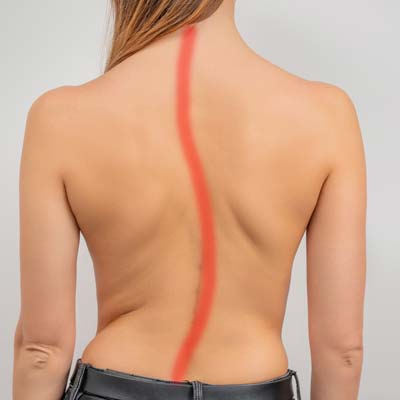Blogs
10 Signs You May Have Undiagnosed Scoliosis

It’s estimated that six to nine million people in the United States alone are affected by scoliosis each year.
Many of these individuals don’t even realize that they have scoliosis, simply because scoliosis awareness is generally low. For those who live with chronic back pain, neck pain, or headaches, it is possible that you are experiencing symptoms resulting from underlying scoliosis that has never been corrected.
To get to the root of the symptoms, scoliosis must be properly diagnosed and treated, which requires that an expert is available to complete a series of x-rays and analyze the condition of the spine.
Dr. Katalina Dean, often referred to as the best scoliosis expert in Midvale City, Utah, has diagnosed and treated countless cases of scoliosis since establishing her practice. Below Dr. Dean shares 10 signs that you may have undiagnosed scoliosis.
#1. You have chronic back pain.
One of the most common symptoms of scoliosis is chronic back pain. Scoliosis-related back pain can happen in any of the three areas of the spine, mainly the cervical spine, thoracic spine, and lumbar spine.
If you’re experiencing aching, throbbing, or sharp pain, it could be because of a deformity in the spinal structure that has caused the spine to move out of its natural alignment, resulting in scoliosis.
#2. You have chronic neck pain
Similarly to chronic back pain, if you’re experiencing aching, throbbing, or sharp pain in your neck, it could be the result of misalignment caused by scoliosis. When this happens, the nerves in the cervical spine area (and in other areas of the spine) can become inflamed.
Inflammation and discomfort in the neck can result even when the abnormal curvature of the spine is in another location. Often, when the body tries to compensate for misalignment, pain can show up in the area that is struggling to maintain or restore balance.
The neck often becomes strained in spines suffering from scoliosis, as the head cannot rest squarely on the shoulders due to structural imbalances, relying instead on the muscles to stay upright.
#3. Can scoliosis cause headaches
Scoliosis often causes something called nerve interference. Nerve interference occurs when the flow of electrical energy (nerve impulses) along the spine is stopped by areas of the spine that are misaligned.
When this happens, migraines and headaches can occur because the body is deprived of optimal energy flow. Many patients who receive scoliosis treatment report experiencing a reduction or the complete elimination of headaches and migraines.
#4. Your shoulders are not level
You may have looked in the mirror or simply noticed that your shoulders are not level with one another. This is often the result of scoliosis, which causes the spine to bend into an unnatural s-shaped curve.
When this happens, the entire balance of the body is thrown off, and sometimes this is visible to the untrained eye. If your shoulders are not level with one another (meaning matching at the same height), it is possible that you might have scoliosis.
#5. Your hips are not level
Just like with shoulders, an abnormal s-shaped curve in the spine can cause other parts of the body to become misaligned. If you’ve ever noticed that your hips are not level at the same height while laying down or standing, it’s possible that you have scoliosis, which is causing the equilibrium in your hips to be disrupted.
#6. One leg seems shorter than the other
Have you ever looked at your legs and wondered “why does one of my legs look shorter than the other?” It could be because of scoliosis. Often when the hips are misaligned, there is an imbalance effect that changes the alignment of other parts of the body, including producing the illusion that one leg is shorter than the other.
#7. You have some immobility in a certain area of the spine
Oftentimes, individuals with scoliosis have some immobility when bending laterally (from side to side) more on one side than another. This is frequently caused by scoliosis. Because of the s-shaped curvature in the spine, flexibility can be different when bending to one side versus another.
#8. You tend to sleep in unusual positions
Do you find that you have to wind your body up like a corkscrew to get comfortable at night? Conversely, can you only feel relief when you lay flat on your back, or use several pillows when you sleep on your side?
If you sleep in unusual or highly specific positions either to get comfortable or relieve pain when you sleep, you may have scoliosis. The pressure points in the spine and back that lead to pain and discomfort are often different for individuals with scoliosis and may require extra adjusting to get comfortable.
#9. You can feel misalignment to the touch
Do you feel misalignment in your spine? If your spine feels laterally curved to the touch, it’s possible that you may have scoliosis. In some cases, it can be perceived just by looking at or touching the back area and noting the irregularities between the two sides of the back which are divided by the spine. If you’ve felt or seen that your back is uneven on both sides of the spine, you may have scoliosis.
#10. You can’t sit or stand for long periods of time
Another tell-tale sign of scoliosis is weakness or discomfort in the spine that arises from sitting or standing for long periods of time. If you find that more than fifteen minutes of standing or sitting makes your back or neck begin to hurt (or brings on a headache), you may be living with scoliosis.
Resolve scoliosis at The Scoliosis Center of Utah.
If you’re looking for a Midvale City scoliosis specialist, then it is time for you to meet Dr. Katalina Dean of Scoliosis Center of Utah. Dr. Dean focuses on treating all forms of scoliosis non-surgically, and has helped correct posture long-term through the use of Chiropractic BioPhysics®.
If you’re ready to experience the unique and individualized care of an expert Midvale City scoliosis chiropractor, contact us today to discuss how we can help you correct your posture, relieve pain, and begin living your best life.
Do You Qualify for Care?
Schedule an Appointment Below
